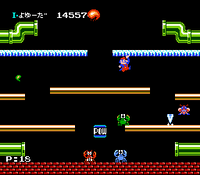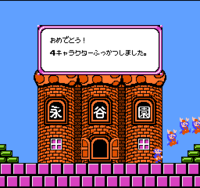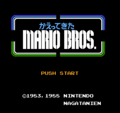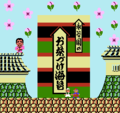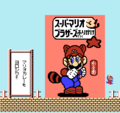Kaettekita Mario Bros.
The title of this article is official, but it comes from a non-English source. If an acceptable English source is found, then the article should be moved to its appropriate title.
| Kaettekita Mario Bros. | |
|---|---|
| File:Kaettekita Mario Bros. possible boxart.jpg | |
| Developer | Nintendo EAD |
| Publisher | Nintendo |
| Platform(s) | Family Computer Disk System |
| Release date | Family Computer Disk System: |
| Genre | Platformer |
| Media | FDS:
Floppy disk
|
| Input | NES:
|
Kaettekita Mario Bros. is a game for the Family Computer Disk System released on November 30, 1988. It is an updated version of Mario Bros. that was released only in Japan,[1] although a 1993 Europe-only cartridge re-release resembles it,[2] using the same enemy sprites and colors from this game. Excluding ports, this is the last Mario game for the Family Computer Disk System.
Game modes
The game has several modes that can be accessed from the main menu.
Original Mario Bros.
This mode plays similarly to the Japanese arcade version of Mario Bros. However, there are several differences from the arcade or earlier NES port.
- One of three advertisements will appear before the first phase. They are for the Japanese food company Nagatanien which sponsored this game. One ad is for ochazuke nori and features singer-actor Saburō Kitajima who appeared in Nagatanien ads during the game's release. The other ads are for gomoku fried rice mix and Super Mario Bros. 3 branded furikake.
- Mario and Luigi can now change direction in mid-air (much like modern remakes).
- Mario's color scheme is the same as his Donkey Kong palette.
- The graphics and music were improved somewhat compared to the earlier port.
- The top five high scores can now be saved like in the arcade version but not in the earlier port. Names can be longer and in Japanese.
Nagatanien World
This mode is similar to Original Mario Bros., but with three additional features:
- In addition to watching one of the three ads like above, another cut-scene addressing the player's registered name will advertise products before Phase 1.
- After losing all lives and receiving a Game Over, players will be given the chance to play a slot machine minigame. Should they get a match, they will be allowed to continue their game without the score and phase counters resetting. However, this area can only be visited once per game.
- Nagatanien (永谷園) - 4 extra lives
- Three matches - 2 extra lives
- Two matches - 1 extra life
- After reaching 100,000 points, players are given promotional codes that can be mailed in for a pack of Super Mario Bros. 3-themed playing cards. At 200,000 points, players are given another code for entry in a drawing for a Super Mario Bros. 3 cartridge, which released one month earlier in Japan on the Family Computer. All players who send in codes receive a free Mario keyring. This promotion was active from November 30, 1988 to May 31, 1989.
Name registration
Players 1 and 2 may register their name, age, and gender. These are used when a high score is broken and to refer to players with honorifics appropriate for their gender.
Notices
In this mode, a Shellcreeper explains the promotional features of Nagatanien World.
Gallery
Super Mario Bros. 3 branded furikake
Names in other languages
| Language | Name | Meaning |
|---|---|---|
| Japanese | 帰ってきた マリオブラザーズ (disk label) かえってきた MARIO BROS. (title screen) Kaettekita Mario Burazāzu |
Mario Bros. have returned[3] |
- Original Mario Bros.
| Language | Name | Meaning |
|---|---|---|
| Japanese | オリジナル マリオブラザーズ Orijinaru Mario Burazāzu |
Original Mario Bros. |
- Nagatanien World
| Language | Name | Meaning |
|---|---|---|
| Japanese | ながたにえん ワールド Nagatanien Wārudo |
Nagatanien World |
- Name registration
| Language | Name | Meaning |
|---|---|---|
| Japanese | なまえとうろく Namae Tōroku |
Name registration |
- Notices
| Language | Name | Meaning |
|---|---|---|
| Japanese | おしらせ Oshirase |
Notices |
